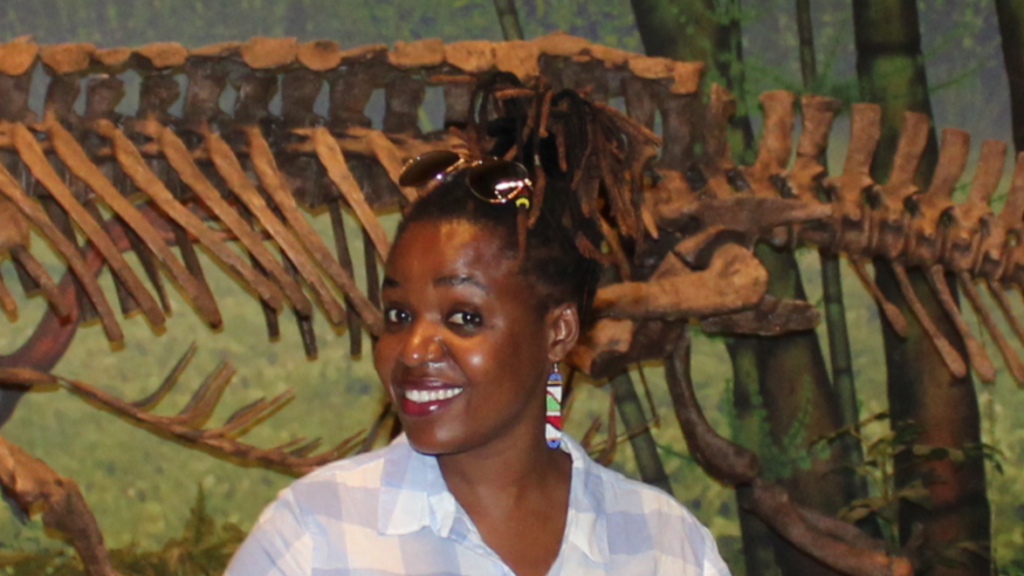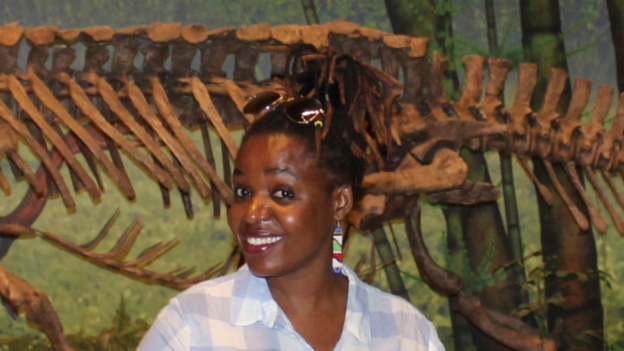
Tandiwe Ngwenya at the Carnegie Museum of Natural History in Pittsburgh, PA
Want to learn what it takes to run refugee camps for an entire country? Listen:
Download audio.  Excerpts permitted, otherwise no derivatives, please.
Excerpts permitted, otherwise no derivatives, please.
For Tandiwe, a six-week civic leadership intensive 7000 miles from home is a bit of a vacation. That is because a normal day for her doesn’t end before midnight, when she’s up answering questions on Skype chat from her teams in Juba, Malakal, and other sites around South Sudan.
Tandi is the Programme Manager for Nonviolent Peaceforce [since this interview was recorded, she has been promoted to Deputy Head of Mission], which provides safe spaces for children, conflict resolution training for women, and security for folks stepping outside their United Nations Internally Displaced Persons (IDP) camps to run basic errands like getting water and firewood. Violence from civil war has been ongoing in South Sudan since 2013, with a shaky peace process now spanning years. Nevertheless Tandi’s teams invest in civilians’ physical and psychological well-being, and they’re making a difference.
Some people have taken notice and invested in Tandi too. She is a 2016 Mandela Washington Fellow, a program started by President Obama to reach out to young African leaders and provide some support for them as they shape the future of the continent.
Out of 42,000 applicants, only 1000 were selected in 2016, and 25 of them came to Duquesne University in Pittsburgh to complete their classroom training. This group is on a tight schedule, with most of each day taken up with lectures from Pittsburgh civic leaders, then site visits, team-building activities, and networking events like Global Pittsburgh’s First Thursdays, which is where I met Tandi.
No stranger to traveling abroad, Tandi is originally from Zimbabwe. This was the comfort zone that she had to step outside of to advance her life in hardcore peace-building, as she describes her work. Tandi comes from the Ndebele tribe, which suffered an attempted genocide in the 1980s, authorized by then Prime Minister Robert Mugabe. It would have been simple to take up a traditional, kitchen-bound gender role, and even a relief as an Ndebele survivor, but Tandi felt driven by the experience to promote peace in the world. She worked with Never Again Rwanda to build cohesion in their post-conflict society. That prepared her – as much as anything could – for the work she does now in South Sudan. She was drawn there after reading “What is the What” by Dave Eggers, the story of Valentino Achak Deng, a Lost Boy forced by the war to flee his home.
As Programme Manager, Tandi coordinates teams across the country day-in and day-out via Skype, WhatsApp, email, and satellite phone. She updates executive staff and donors, and she is the first point of contact for Human Resources challenges, such as when staff members are overcome with stress from the security risks or from the trauma of the civilians. The living conditions are that of oppressive heat, limited fresh produce, and periodic tent-dwelling when she’s working from the field. The clientele are hundreds of thousands of civilians who have lost their homes and are crammed into temporary camps. Tandi says of coming from Rwanda to South Sudan, “I thought I had seen the worst but I hadn’t seen anything.”
Tandi has developed a broad and deep skillset that allows her to function in this environment. She has the cultural sensitivity to interact with people from different backgrounds – both inside and outside the organization. Her management skills allow her to keep track of which teams are running which initiatives where and how they’re progressing. She’s also skilled in procurement, security assessment to know when to pull teams out, and conflict resolution of her own, like how not to reciprocate when someone from the community that you’re serving slaps you in the face.
When I asked Tandi whether she could have learned peace-building in a classroom, she said no, “Theory and practice really never go hand in hand.” Through practice and mistakes, she’s built up the knowledge, resources, and instincts to make good decisions. Tandi’s career choices have served as stepping stones, preparing her professionally and personally for the challenges of what’s coming next. “I don’t think I would be where I am right now in the field, in Nonviolent Peaceforce, if I hadn’t worked in Rwanda. It’s like it was a whole wealth of knowledge and skills that actually my employer picked [when they hired me].”
The Mandela Washington Fellowship wasn’t the first entity to see Tandi’s capacities and invest in her. She’s been mentored by supervisors in three countries: in Zimbabwe, where her boss taught her about management; in Rwanda, where her boss dedicated consistent attention to mentorship activities; and in South Sudan, where the current country director for Nonviolent Peaceforce is always available to help with making tough decisions. Tandi’s hero is her mom, a strong woman who rises to challenges and takes risks, who Tandi says, “embodies everything that I want to become.”
Tandi isn’t done growing, learning, or making a difference. The Mandela Washington Fellowship is just one step on her journey. Through her career path, she has connected with organizations that she sees making a difference, despite the increasing risks. But she hasn’t become an intimidating figure or taken on a towering personality – her work is serious, but chatting with her, she asks friendly questions and makes gently ironic jokes. There’s room for regular people to get involved in extraordinary work, so don’t let reading this article be the final step in your involvement in Tandi’s story.
Questions to build your action plan:
- Where did you feel your mind wander or your heart reach for while reading this? Are you giving in to your desire to make a difference there or resisting it?
- What was a mistake you made that taught you something you were able to use thereafter? How does your current situation enable you to try new things that might fail?
- What organizations or individuals are making a difference in an area that concerns you? Are there ways to try and increase or improve your involvement with them?
- Tandi said she wasn’t much of a soda drinker before this job, but now the simple act of drinking a Coke is part of her routine to de-stress. What are the big and little ways you are protecting yourself from burnout – not once in a while, but habitually every day?
The Mandela Washington Fellowship does not include financial support of Fellows or the organizations where they’re involved, so consider donating to Nonviolent Peaceforce to make sure that Tandi and her staff have what they need.
Listen to the full uncut recording of this interview.  Excerpts permitted, otherwise no derivatives, please.
Excerpts permitted, otherwise no derivatives, please.
Music credits: “Romantic West” by David Recoing, “We Will Always Be One” by the South Sudanese Women Association in Uganda, and “Ambient Ambulance” by Jingle Punks. Thanks to Barb Cathey, Susan Loucks, and Mike Sorg for providing feedback, and Yousef Jefferson and Rose Hilmara for encouragement.
